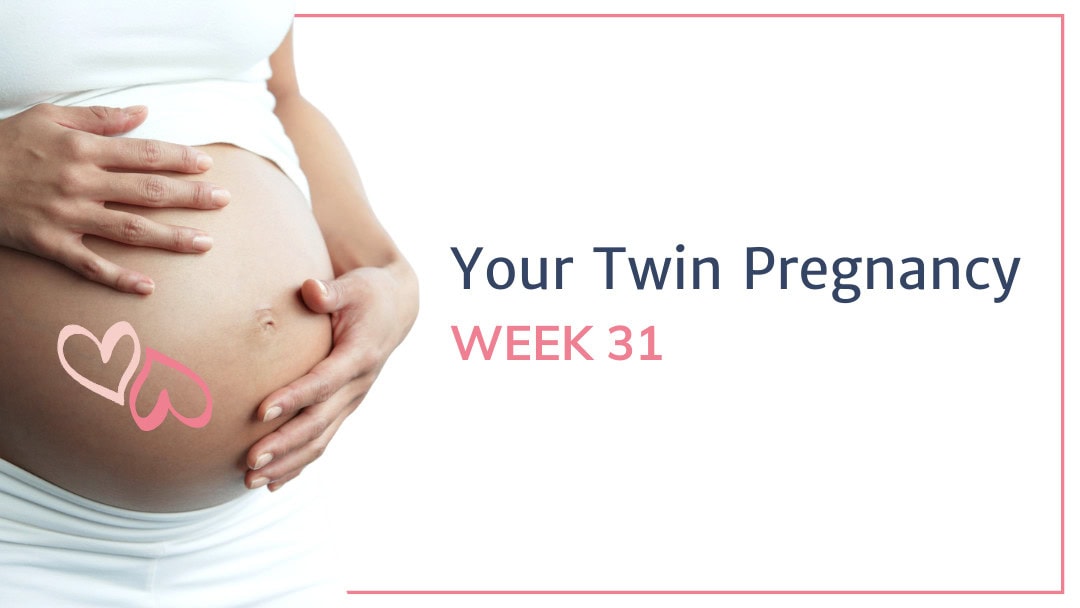You’ve made it to week 31 mama! And if you are having identical twins, it will only be a few short weeks before they arrive. Can you believe it?
At this point, you’re probably starting to think a lot more about what life will look like once your babies arrive. Preparing for twins can feel a bit like packing for an adventure that you’ve never been on before.
This week, we’re going to dive deep into what you can expect during the first four weeks with your newborn twins. We’ll cover everything from feeding routines to postpartum recovery, so you’ll feel ready to navigate those early days with confidence and calm.
How are you feeling mama?
Twin Pregnancy Symptoms at 31 Weeks
By week 31, you’re probably feeling a mix of excitement and exhaustion. Your belly is growing, your energy may be dipping, and sleep might be more of a distant memory than a reality (hello, frequent bathroom trips and heartburn!).
You might also be feeling some Braxton Hicks contractions—just your body practicing for the real deal! And as your body prepares for birth, you could be dealing with some swelling, back and hip pain, and even shortness of breath as your babies push up against your diaphragm.
Don’t forget to take things slow and ask for help when you need it. These last weeks are all about resting up as much as possible before your two little bundles of joy make their grand entrance.

What are your twins up to this week?
Your Twins at 31 Weeks – Height & Weight
At 31 weeks, your twins are each about the size of a coconut, measuring around 16 inches (41 cm) long from head to toe. They each weigh about 3.3 pounds (1.5 kg), but keep in mind that there can be variations between fraternal and identical twins. Fraternal twins may grow at slightly different rates, while identical twins tend to stay more in sync.
Your Twins’ Fetal Development at 31 Weeks
At this stage of pregnancy, your twins are going through some incredible developments. While their major organs are mostly developed, some of the finer details are still taking shape. Here’s what’s new and exciting this week:
By week 31, your twins’ immune systems are becoming more sophisticated. Although they’ll still rely heavily on you for immunity after birth (especially if you breastfeed), their immune systems are now starting to produce white blood cells – crucial for fighting off infections in their first few weeks of life.
Your twins’ brains are going through a rapid growth phase this week, with billions of neurons firing and connecting to manage every single bodily function, from breathing to heartbeat regulation and, eventually, cognitive functions like memory and learning.
Your twins are honing some of the vital reflexes they’ll need right after birth, particularly the ability to suck and swallow. This is crucial for helping them to feed from day one, whether you choose to breastfeed or bottle-feed.
While we’ve mentioned that their lungs are maturing, one key development happening now is the production of surfactant—a substance that will help their lungs expand after birth. Surfactant prevents the tiny air sacs in their lungs from sticking together when they exhale, making breathing easier once they’re born. At 31 weeks, your babies are producing more surfactant, which means they’re getting closer to being able to breathe on their own. This is especially important for twins, who are often born early and may need some assistance with breathing in the first few days.
By now, your twins’ hair is growing, and their nails are fully developed. In fact, their fingernails and toenails are starting to reach the tips of their fingers and toes. Some babies are even born with long nails, so you may need to trim them shortly after birth to prevent them from scratching themselves.
What you might be wondering about this week
What to Expect: Your First Four Weeks with Newborn Twins
Now, let’s talk about what life might look like during those first few weeks after your twins arrive.
By now, you’ve probably heard stories, read books, and talked to friends, but nothing truly prepares you for the whirlwind of the newborn stage—especially when you’ve got two little ones! Here’s what you can expect and how to manage those early days:
Establishing a Routine for Two
The first few weeks with twins will feel like a whirlwind of diaper changes, feedings, and snatches of sleep, but creating a routine can be a lifesaver. Keep in mind, though, that newborns are unpredictable, so flexibility is key.
While you might not be able to enforce a strict routine immediately, you can start by syncing your babies’ feedings and diaper changes. This helps prevent situations where one baby is awake while the other is sleeping, giving you slightly longer windows of rest.
Establishing a nighttime routine—like dimming lights, playing soft music, or giving a warm bath—can also help your twins learn to differentiate day from night, though this process takes time.
A general routine provides predictability and can reduce the overwhelming feeling of constantly tending to two babies with differing needs.
Feeding Newborn Twins: Breastfeeding, Formula, or Both
As we discussed back in Week 28, feeding twins can be one of the biggest challenges in the early weeks.
Whether you’re breastfeeding, formula feeding, or doing a combination of both, it’s important to develop a plan that works for you.
Breastfeeding twins can be demanding, but it is absolutely possible with the right support.
Tandem breastfeeding—feeding both babies at once—can save you time, but it may take a few weeks to master.
You’ll want to experiment with different positions, like the “double football hold,” to find what’s most comfortable.
If you’re formula feeding, prep bottles in advance, or better yet, get a Baby Brezza Formula Pro to save time during night feeds. Many twin parents LOVE the time it saves.
Some twin moms opt for a combo of breast and formula feeding, which can offer flexibility. Don’t hesitate to reach out to a lactation consultant if you’re struggling with breastfeeding—getting help early can make all the difference.

Getting Help: Why Support is Essential
Having twins often requires more hands than you’re used to. The reality of caring for two babies at once can be overwhelming, and having a solid support system is crucial.
Don’t be afraid to ask for help from friends, family, or even professionals like a postpartum doula or night nurse. If possible, have someone available to assist during the night or alternate with your partner so one of you can get a stretch of uninterrupted sleep.
You may also want to consider organizing help for household chores, errands, or even simple tasks like holding one baby while you take care of the other. Accepting help doesn’t mean you aren’t capable—it means you’re smart enough to protect your energy for the moments that matter most with your babies.
Sleep (or Lack Thereof): Coping with Newborn Twins’ Sleep Patterns
Sleep will likely feel like the biggest challenge in the first month. Newborn twins don’t tend to sleep in long stretches, waking frequently for feeds and diaper changes.
It’s normal to feel exhausted, but there are ways to cope.
First, try to sync your twins’ sleep schedules as much as possible—when one wakes for a feed, wake the other so they stay on the same cycle. It can also help to create a consistent sleep environment with a quiet, dim room and a calming bedtime routine to signal to your babies that it’s time for rest.
Taking shifts with your partner or another support person can also allow you both to get longer stretches of sleep.
While it’s very hard to do, and I would roll my eyes whenever anyone suggested it, if you can take a nap while your babies are sleeping, then do.
Realistically, your babies will only nap for 1.5 hours, and you still need to eat, pee, and shower yourself, plus keep up with the piles of washing, which you can only do when your babies are sleeping. If you can, try to grab the occasional snooze (even if it’s on the couch) – you will feel much better for it.
READ MORE: Your Newborn Twins – Sleep
Managing Your Own Recovery While Caring for Twins
Recovering from childbirth while caring for twins is no small feat, especially if you’ve had a C-section. Be gentle with yourself and prioritize healing.
In the first few weeks, you’ll likely still experience postpartum bleeding, soreness, or even incision pain if you had surgery. Make sure to rest as much as possible and accept help from others with tasks that involve lifting or bending.
Staying hydrated and nourished is key for recovery, particularly if you’re breastfeeding, as this increases your energy levels and supports milk production.
Listen to your body and allow yourself the grace to recover at your own pace. Remember that healing takes time, and the more you focus on your recovery now, the stronger you’ll feel in the weeks to come.
Bonding with Both Babies: Ensuring Quality Time with Each Twin
It’s natural to worry about how you’ll bond with both twins equally, but rest assured that you will develop a special connection with each baby.
You might notice different personalities early on, and that’s okay! Take time each day to engage with each baby individually, even if it’s just during feeding or diaper changes.
Skin-to-skin contact is a great way to bond, as is making eye contact and talking to each baby.
Some parents also set aside one-on-one time, where one baby gets special attention while the other is with a partner or family member. Over time, you’ll find your rhythm and connect deeply with both babies as individuals.
Tandem Diapering and Bathing: Time-Saving Tips
Changing diapers and bathing twins can feel like a marathon, but with a few tips, you can make the process smoother.
Tandem diapering—changing both babies one after the other—can save you time, especially if you set up a diapering station with everything you need in one place (diapers, wipes, creams, and changes of clothes).
For bathing, some parents prefer to bathe one baby at a time, but if you’re comfortable and have help, you can bathe them together in a twin-friendly bathtub.
Having a small basin for each baby can make the process safer and more manageable. Set a routine where you’re always prepared with towels, fresh clothes, and any essentials nearby, so bath time becomes a smooth and enjoyable bonding experience.
Caring for Yourself Emotionally: The Rollercoaster of New Parenthood
The emotional transition to life with twins can be intense. The first month is often filled with joy, but it can also bring feelings of overwhelm, anxiety, and even sadness, especially if you’re dealing with the baby blues or postpartum depression.
It’s important to check in with your mental health and reach out if you’re feeling down. Don’t hesitate to talk to your doctor, partner, or friends about how you’re feeling—it’s normal, and you don’t have to go through it alone.
Simple practices like deep breathing, light movement (if approved by your doctor), and even a few minutes of quiet time can help ease emotional strain. Give yourself permission to feel all the emotions that come with this big life change – it’s a huge change mama, so be kind to yourself too.
Tracking Milestones and Growth in Two Babies
The first month with twins will pass in a blur, but it’s also filled with small but meaningful milestones.
In addition to tracking feeding and diapering (which will help you monitor their health), you’ll start to notice the little things—like their first smiles or their growing ability to lift their heads during tummy time.
Each baby will develop at their own pace, so don’t stress if one twin reaches milestones a little earlier or later than the other. Keep an eye out for basic newborn behaviors like sucking, grasping, and reacting to sounds.
You can use an app, or we have our downloadable Our Twins Daily Journal, which is designed just for twins and gives you space to record everything you need.
Tracking these milestones will not only help you remember these precious moments but also assist your pediatrician in monitoring your twins’ development.
Your Partner’s Role: How to Work as a Team
Raising twins is a team effort, and your partner’s involvement is crucial during the first few weeks.
Dividing tasks and responsibilities can help reduce stress and ensure that both parents are involved in caring for the babies. For example, one partner can handle diaper changes and bottle feeds, while the other focuses on soothing and putting the babies to sleep. Take turns with nighttime duties, allowing each of you to get some much-needed rest.
Open communication is key—check in with each other regularly to make sure both of you feel supported. Working as a team not only strengthens your relationship but also helps create a loving, balanced environment for your twins.
Before you go…
You’re almost there, mama! Week 31 is a great time to start wrapping up your baby prep and mentally preparing for what’s to come.
The first four weeks with your newborn twins will be full of joy, challenges, and sweet moments you’ll treasure forever.
And remember, you’ve got this!
Take care and much love.

P.S. Want to receive a reminder email to come back and read the next post in this Twin Pregnancy series? Register for our Twin Pregnancy & Preparing for Twins emails, and it will drop straight into your inbox.


